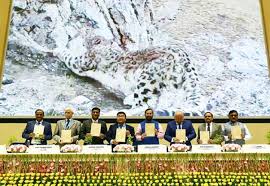
04
Nov
India’s #23for23 Initiative: A Landmark in Snow Leopard Conservation
India’s #23for23 Initiative: A Landmark in Snow Leopard Conservation On October 23, 2025, coinciding with International Snow Leopard Day, India launched the innovative #23for23 campaign, marking a major step in snow leopard protection. The initiative also unveiled the country’s first National Snow Leopard Census, which recorded 718 individuals across the Indian Himalayan region. Thi...
Read More







